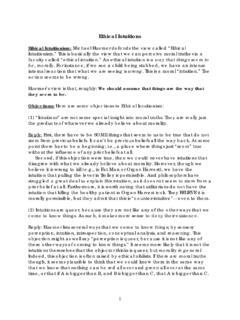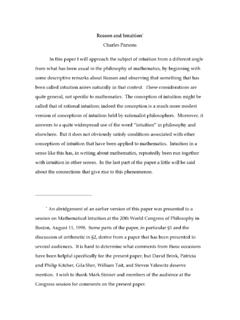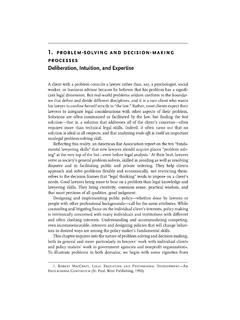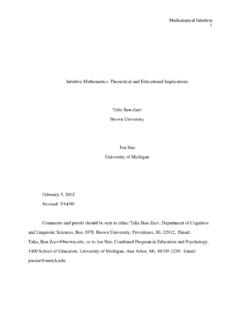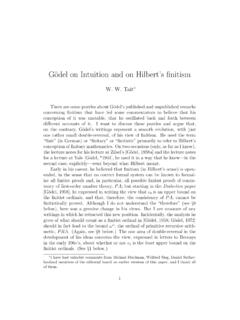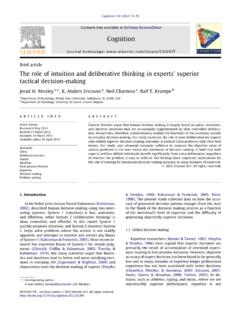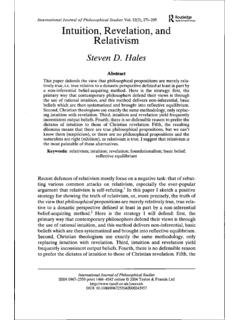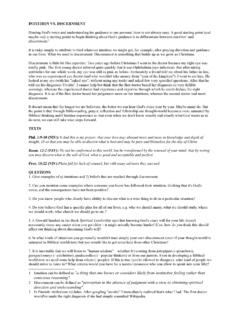Transcription of Moral Intuition - Jefferson McMahan
1 LaFollette The Blackwell Guide to Ethical TheoryO103 Chapter 5 Moral IntuitionJeff McMahanMoral InquirySuppose we wish to understand a particular Moral problem for example, abor-tion. One way of proceeding is to reason on the basis of our existing substantive Moral beliefs. We may, however, suspect that our Moral beliefs about abortion, insofar as we have any prior to serious reflection, are unreliable. We may suspect, for example, that our beliefs about abortion reflect the influence of a religious education that we now repudiate, or that our feminist sympathies may make us insufficiently sensitive to the status of the fetus.
2 Thus we may take as our starting point certain related Moral beliefs about which we are more confident for example, that killing an unthreatening, morally innocent, adult human being (or person, for the sake of brevity) whose continued life would be worth living is, except perhaps in the most extreme circumstances, seriously wrong, while pain-lessly killing a lower nonhuman animal (for example, a mouse) may be permissible provided that the interests that are thereby served outweigh those of the animal that would be frustrated by its death. There is, of course, divergence of opinion even about these cases.
3 Some people believe that intentionally killing a person can never be justified, while others believe that it can be justified whenever it is neces-sary to save the lives of a greater number of innocent people. And, while some believe that there is no objection whatever to killing a mouse independently of the effects this might have on human interests, others believe that killing a mouse is seriously objectionable just because of the effect on the mouse and requires a strong justification in order to be permissible. Nevertheless, everyone agrees that, in ordinary circumstances, killing a person is more objectionable morally than killing a Blackwell Guide to Ethical Theory, Second Edition.
4 Edited by Hugh LaFollette and Ingmar Persson. 2013 Blackwell Publishing Ltd. Published 2013 by Blackwell Publishing 1031/11/2013 4:34:04 PMLaFollette The Blackwell Guide to Ethical TheoryOJeff McMahan104We could therefore initiate our inquiry into abortion by exploring our confident sense that there is a significant Moral difference between killing a person and killing a lower animal so that, for example, the killing of a lower animal might be justi-fied by appeal to considerations that would not constitute even the beginning of a justification for killing a person.
5 With these beliefs as our starting point, we could work our way toward a better understanding of abortion. We could proceed by trying to understand why killing a person is generally wrong and why it is generally so much more seriously wrong than killing a lower animal. What are the relevant differences between a person and a lower animal? Are the properties of persons that make killing them generally worse all intrinsic properties? Or is part of the explanation of the greater wrongness of killing persons that we normally bear certain relations to them that do not exist between ourselves and animals?
6 In addressing these questions, we may consult our intuitions about a range of par-ticular cases and this may yield provocative results. We may notice, for example, that the extent to which killing an animal seems wrong varies with the degree of harm the animal suffers in dying. Thus it seems more objectionable to kill a dog than to kill a mouse; and the explanation seems connected with the fact that the dog loses more by dying. But we may also notice that the extent to which it is wrong to kill a person does not seem to vary with the extent to which death is bad for the victim.
7 Thus it seems no less wrong, other things being equal, to kill a dullard than to kill a genius, or to kill an elderly person with a reduced life expectancy than to kill a person in the prime of our understanding of the morality of killing in general increases, we can begin to extract from our findings various implications for the morality of abor-tion. Suppose, for example, that we discover that there are certain properties that adult human beings generally possess that lower animals do not that seem to help explain the difference between killing people and killing animals.
8 We can then consider whether these properties are possessed by human fetuses. If they are, then in that respect abortion is relevantly like the killing of a person; if not, there is then reason to suppose that abortion is morally more like the killing of remarks about abortion are intended only to provide a sketchy illustration of a certain approach to practical ethics, a certain general pattern of reasoning about Moral problems. Its most conspicuous feature is that it treats certain sub-stantive Moral beliefs that we already have as prima facie reliable starting points for Moral inquiry.
9 It presupposes that at least some of our Moral intuitions have a certain presumptive epistemic are Moral intuitions? As I will understand the term, a Moral Intuition is a Moral judgment typically about a particular problem, a particular act, or a par-ticular agent, though possibly also about a Moral rule or principle that is not the 1041/11/2013 4:34:04 PMLaFollette The Blackwell Guide to Ethical TheoryO105 Moral Intuitionresult of inferential reasoning. It is not inferred from one s other beliefs but arises on its own. If I consider the act of torturing the cat, I judge immediately that, in the circumstances, this would be wrong.
10 I do not need to consult my other beliefs in order to arrive at this judgment. This is not to say that a Moral Intuition is necessarily elicited instantaneously, the way a sense perception is. If a particular problem or case is complex, one may have to consider it at length in order to distinguish and assimilate its various relevant features in much the same way that one might have to examine the many details of a highly complex work of art in order to judge or appreciate belief that I cited as one of the possible starting points for an inquiry about abortion namely, that killing a person is generally wrong may or may not count as an Intuition according to this understanding, though for most of us it has an intuitive basis.
